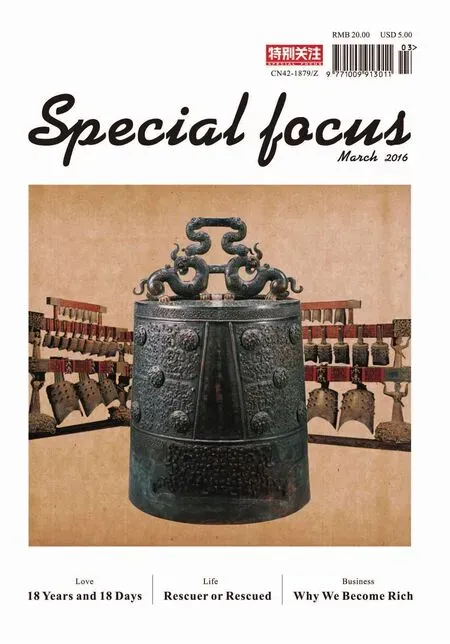The Commander’s Secret
By Qing Si
The Commander’s Secret
By Qing Si
E arlyinTongzhi’sreign (1861-1875AD),during China’s Qing Dynasty,General Dorongga oversaw the military affairs of Shanxi Province,at the emperor’s command.The general’s army had to recruit many laborers for camp services,and Chen,a dark-skinned boy whose face was covered with pimples and scars,was among those who came for recruitment.
The boy was quite big and strong,and was assigned to take care of army horses.As a testament to his notable strength and fortitude shown in his labors,Chen was quickly chosen to be a soldier,and made contributions continually in the following successful military campaigns.
A single decade of frequent wars changed the fate of the ugly lad forever: he was graced with the title of Baturu (“valiant war hero”)and promoted to the rank of provincial commander,under thedirectcommandofthefamous viceroy Zuo Zongtang,the then Governor-GeneralofShaanxiandGansu Provinces.
Commander Chen was very close with one of his secretaries,whose name was Zhu.Zhu was an intellectual who had repeatedly failed the Imperial Examination(which was essentially the only means in ancient China to become a government official),anddecidedto work for the army.Zhu was handsome, gentle,and courteous,and Chen seemed to love how complimentary their traits were.
Chen’s love later proved to be quite literal,when one night he invited Zhu to his house to drink with him.After several cups of wine,Chen suddenly requested his guest to sleep with him.Zhu wasaghast at the unexpected request and refused at once,but as Chen drew out a blade,the unarmed secretary began to think his life was more sacred than his sexual preference.
Again,even more unexpectedly,Zhu found that there was no need to compromisehissexuality;whenChenundressed,it turned out the commander was actually a woman.From that day on,Zhu visited Chen every night,and theyweretogethereveryday.This would have been a happy ending had the other officers had not discovered their special relationship and expressed reasonable contempt.
Even worse,Chen became pregnant. The commander didn’t dare to see a doctor because the exposure of her gender would be an unforgivable scandal, which could lead to her death.When she asked Zhu what to do,the secretary said that a confession to her superior,Zuo Zongtang,could possibly work,according to the ancient precedent of Hua Mulan[1].

Astonished at Chen’s confession,Zuo was going to report the incident to the Imperial Court,but was stopped by one of his aides.The aide told Zuo that anyattempt to report this news was unwise because it had been Zuo who had recommended Chen to be promoted.If this incident inspired the emperor’s wrath,it might fall upon Zuo as well.
Zuo thought the aide’s words were reasonable and moved forward with a different strategy.He secretly ordered Zhu to be renamed as Chen,and to take Chen’s position;at the same time Chen was ordered to abandon all her positions and become Zhu’s wife.
Now Zhu was a man of power.He began to feel that Chen was an unworthy wife,for her skin was too dark,her face covered with scars,and her body too big and stout.In a word,she was not the graceful lady a man of power would like have.
When Zhu(with Chen’s name)attained some success on the battlefield, he applied for the recovery of his original name,and his application was allowed.Then,Zhu married two concubines.
Chen was furious but helpless.She had neither the power to stop her husband nor the determination to expose all of the secrets.The former lady commander made her final decision.She broke up with Zhu,and moved away,taking her son and her personal belongings with her.
There is a folk ballad,calledYousuosi(“Thinking of My Lover”),from the Han Dynasty(202—220BC)collection. In the ballad,when a girl discovers her lover has cheated on her,she decisively breaks the expensive hairpin she was about to give the unfaithful man,and says that she will“cease her thinking of the man from now on.”In our story, Chen is as decisive both in her pursuit of love and in her acquittal of it.
The above story is excerpted from Qingdaiyeji(“Unofficial Anecdotes of the Qing Dynasty”)written by Zhang Zuyi.The fortitude and decisiveness of the heroine was so appreciated by the author that he commented,‘if there could be an opera adapted from the story,it would be held as a new classic.’
Note:[1]Hua Mulan is a legendary woman warrior from the Southern and Northern Dynasties(420–589AD)of China who was originally described in a ballad known as the Ballad of Mulan.In the ballad,Hua Mulan takes her aged father's place in the army.She fought for twelve years and gained high merit,but she refused any reward and retired to her hometown instead.
(FromBinhai Times,Aug.25,2015. Translation:Wang Xiaoke.Illustration: Chen Quansheng.)

